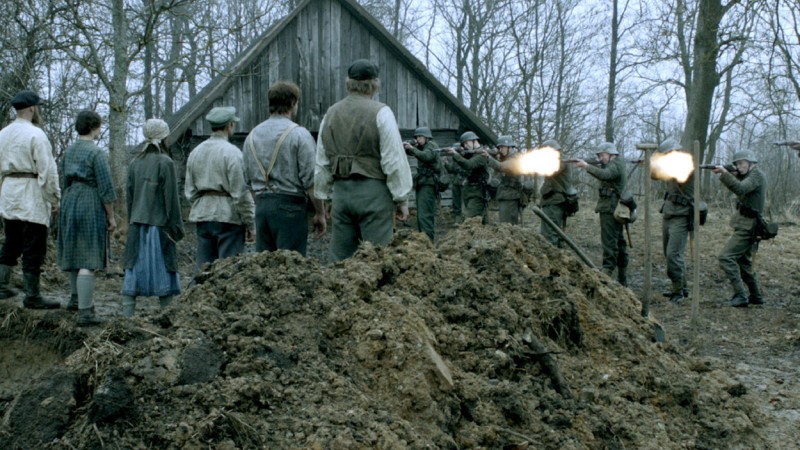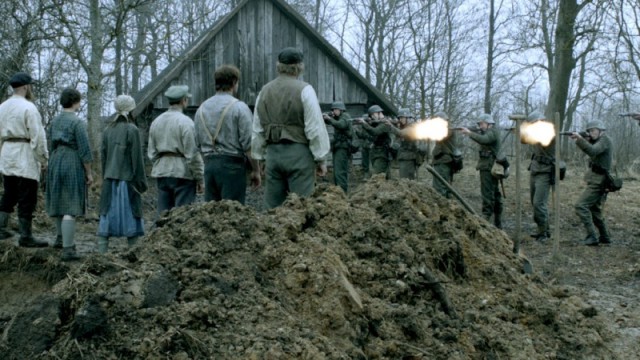The program, Generation War, is a five-hour long epic that wanted to bring the experiences of ordinary German soldiers on the Eastern Front during WWII. The mini-series was seen by more than seven million viewers when it first aired in Germany last year. The series was shown in three parts and was originally titled Our Mothers, Our Fathers. The series has garnered censure from critics who claim that it lessens the cruelty of the Wehrmacht that carried out Hitler’s genocidal agenda. It also emphasized the anti-Semititsm endemic among many of the Slavs who both resisted and collaborated with the Nazis. It suggested an equivalence that diminished the centrality of Germany in causing the Holocaust, the Daily Beast reports.
Aside from the debates, we should ask: “What is the draw that the Germans feel to watch every one of the three parts of the TV series?” It may appear to be the conflict receding into history. The germans seem to be looking for a usable past—something they can bring back from the evil chapter of the Third Reich and the taint that’s left from the genocide.
The attempt to bring a glimmer of pale light from the abysmal dark days of Hitler, there is a considerable amount of history in German post-war filmmaking. The genre covers the land, air, and sea. These films include The Devil’s General (1955), which stars Curt Jurgens as Harras, a Luftwaffe general who defies his Nazi comrades and pays a noble price; The Bridge (1959), depicts a cadre of German teens sent out on a senseless mission to protect a bridge from the advancing Allies during the final days of the war; and The Boat (1981), which shows a U-Boat crew as fatalistic mariners in the service of the country—far from the killing fields of Eastern Europe. Generation War, though far more ambitious, falls within these genre.
The story behind Generation War is that of five young friends—two women and three men—who we see dancing to illicit jazz music in Berlin on the evening of the invasion of Russia in 1941. Two of them, Wilhem and Friedhelm, are about to leave for the front lines. The women, Charlotte will become a front line nurse, and Greta, will pursue her ambitions as a singer. The fifth member of the group is Greta’s lover, Viktor, a Jewish man who will go through his own odyssey. They vow to meet after the war—home for Christmas—for a reunion at their favorite bar in Berlin. The effects of war will alter their illusions.
Among the things in the film that tax one’s credulity from the outset is the friendship of a German officer readying to battle and the love affair between a Jewish tailor with an Aryan woman. This asks the viewer to have an incredible imagination that not everyone who is familiar with Nazi German is ready to make. Granted, this is fiction and must allow the screenwriters some creative license; however, with the use of actual WWII battle footage and an end-credit that lists the fate of each protagonist, the film relies on the ability to be authentic and it requires us to judge the film on historical accuracy.
The main fallacy of Generation War is of the Winter brothers, Wilhelm and Friedhelm. These two gentlemen are to be believed as the typical German front-line soldiers in the East. Wilhelm, the elder brother, objects to the murder of the Jews and other prisoners; however, he is overridden by Nazi zealots who are in command. Friedhelm is disgusted by the entire idea of the conquest; even though he will eventually change into a very different kind of man. Even by their supposed decency, they are not ordinary German soldiers. They are actually extraordinary men who do not follow the typical legion of men who followed Hitler’s orders to the Russian front. Sure, there were German soldiers who did their duty and were able to retain some of their decency during horrific times. These men were able to save the honor of the German Army in the East and it was men like these who are portrayed as the protagonists in Generation War.
Although there is a considerable amount of evidence that there were too many in Wehrmacht that participated directly in the murder of a million Jews during the invasion of Russia. The soldiers were key in rounding up the Jews and their ultimate demise. Sometimes they used local volunteers; often they did the work themselves. They would send home post cards and photographs that depicted what they were doing; which have been documented very well. The Russian Jews were not sent to camps; instead they were killed in place and, although Einsatzgruppen were at the forefront of the slaughter, the Wehrmacht was crucial in carrying out the duties.
This was not shown in the movie. Instead, the atrocities were always shown as being carried out by special squads of Nazi idealogues—often who were in league with Ukranian auxiliaries—whose depredations were isolated from the valor of the soldiers. There were people who were repulsed by the conduct, others were aloof, and still there were some who simply turned a blind eye. But by and large, there would have been a rare chance that a German soldier on the Eastern Front who was unaware or did not take part in some capacity, in the war against the Jews; many of them did so enthusiastically.
The series is not a whitewash. It doesn’t steer clear of the Nazi slaughter of the Jews, partisans, civilians, and innocents in the Bloodlands of the East. One of Wilhelm’s officers observes: “This is not a normal war.” The film doe get a few things right: the ubiquitous anti-Semitism of the Poles—which bothered Warsaw—is an uncomfortable truth. Yes there were decent Poles who were honorable by helping the Jews. There were too many that were poisoned by Jew hatred, ravaged the surviving remnant. While Polish anti-Semitism was often murderous, mindless, and spontaneous; the Germans were systematic, comprehensive, and thorough. Also, neither the Polish government in exile nor the leaders of the Home Army condoned anti-Semetic measures.
Another uncomfortable truth the series addresses is that after the war, a Nazi zealot was responsible for the misfortune of two of the protagonists, ends up working for the Allies. He is then protected by his American patrons. This alludes to the countless Nazis who were able to evade prosecution as the Allies sought to use their skills for the Cold War.
We need to remember that other nations have tried to find some small sense of solace in what may have been an irredeemable past. With the passing of time there is an inevitable revisionist history that has emerged among German writers. There are books that dwell on the Allied bombing campaign that was aimed as much at demoralizing civilians as it was to destroy the Reich’s industrial capacity. Another subject that people like to focus on is the Russian invasion that was accompanied by the mass rape and pillage condoned by the Red Army. These efforts of equivalence tend to fall short. Bombing a population to achieve its surrender isn’t the same as annihilating it. The Soviet reprisals, whoever, brutal, did not amount to the enslavement or worse that a victorious Reich would have thrust upon the Russians. It isn’t surprising that a new generation searches for ways to reclaim something salutary from its shameful past. There is a need in to popular imagination for wresting at least a small glimmer from the dark reality of the past.
This doesn’t justify what is eluded and elided in Generation War—the dates and places create a phantom counter-film for those who are aware of the ominous—but to explain why it was able to touch the nerve with the current German audience. What was important for them was not to create “Good Germans”—film like The White Horse, about a martyred School siblings, have already done that. Instead, it was to show that not all of their ancestors were “Bad Germans,” that they were trapped in the grey area that would allow for certain wiggle room within the moral compass. Sure, they have much to answer for because they supported the horrific regime, but they didn’t do the worst. History does not support them and with the availability of new research through recent years should have made this fact apparent to the filmmakers.
Lieutenant Wilhelm Winter says that the outset that he was fighting for the Fatherland. By 1941, he was fighting for the Fuhrer. He and his comrades had taken an oath of loyalty to Hitler. To fall for Germany may have been a noble act; but, fighting for Hitler was not. As the German Army collapsed, Wilhelm laments the needless slaughter of millions at the behest of the maniacal ambitions of the Third Reich.
He concludes that “the war brought out the worst in us.” Germany’s war generation that came of age between 1933 and 1943 were already indoctrinated in the ideology of Hitlerism.

